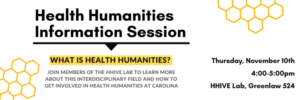By: Noelle Escobal
On Thursday, November 10th, 2022, HHIVE held a brief information session with current lab members to discuss important topics of the health humanities. According to Sarah Lofstrom, a doctoral student and teaching fellow of English and Comparative Language at UNC, the health humanities is an “innovative, interdisciplinary field that aims to incorporate social and health justice as well as examine multiple social determinants of health.” She further emphasizes that the health humanities “does not exist in a vacuum,” but is rather informed by several cultural socio-political contexts. In other words, the health humanities is born of and influenced by many factors. Through a combination of narrative mediums (fiction, comics, visual arts, historical archives), the health humanities aims to conceptualize and contextualize illness as a lived experience rather than an isolated, medicalized, or foreign entity. Combining the physical sciences with social science scholarship, the field of health humanities seeks to study individual experiences and acknowledge the complexity of the human condition as it relates to both health and medicine.
Through narrative-focused research, the HHIVE Lab’s mission is to promote the health humanities as well as to forge a community for those interested in studying aspects of the health experience. In other words, HHIVE is a student-driven creative space for health humanities research that seeks to encompass perspectives, insights, and approaches that ultimately provide insight into the human condition. For instance, some HHIVE-affiliated projects include its collaboration and engagement with local oral history programs such as the Community Histories Workshop, which aims to “work with local communities to recover, preserve, and share the memories, stories, and materials that reflect the multi-layered histories of place.” The workshop, which is co-directed by one of UNC’s finest professors of American Studies, Dr. Robert Allen, is currently invested in the history and closure of the Dorothy Dix Asylum in North Carolina, which held more than 7,500 psychiatric patients from 1856 to 2012. The lab’s collaboration with Dr. Allen’s Community History Workshop teaches interested individuals the importance of engaging with history and how that history ultimately shapes the future.
An additional ongoing project endorsed by HHIVE includes its collaboration with Dr. Melissa Troester and the Carolina Breast Cancer Study. This study, which has been ongoing for about 30 years, researches the racial health disparities of breast cancer in black and white women through collections of genetic and molecular data, as well as through surveys and interviews. Specifically, Dr. Troester aims to conceptualize, illuminate, and reduce experiences of racism in healthcare environments. While doing so, she understands that the particular lexicon within standard surveys and interviews do not seem to be capturing the full experience of individuals. Her partnership with HHIVE offers the unique opportunity for interested individuals to explore methods of oral research, as well as to conduct their own interviews, in order to develop a better system for capturing and recounting the human experience. Oral histories are ultimately a unique space in which history is tracked through present and personal experiences. Conducting oral histories allow the interviewer to gain a complex, yet complete, understanding of the individual’s experience. It also gives power to the interviewee to describe their experiences through their distinctive words and tones. Dr. Troester understands that collaborations with those of humanities departments is critical to developing a new methodology of research: oral history.
The HHIVE information session also included a student panel showcasing four of HHIVE’s Undergraduate Research Assistants, all of whom were 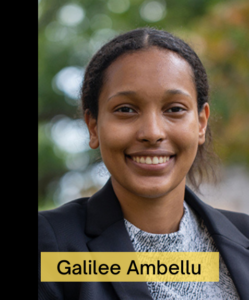 eager to share their unique experiences studying the health humanities. When asked how the health humanities shaped her experience, Galilee Ambellu, a third-year honors student studying Health Policy and Management with a minor in Medicine, Literature, and Culture, expressed her appreciation for HHIVE-affiliated classes and coursework. She describes her experiences taking ENGL 695, a research intensive health humanities seminar with UNC HHIVE co-director Dr. Jordynn Jack. She reflects on what she had learned about the “explanatory model,” which is a model that has taught and continues to teach prospective health providers to cure rather than to listen. To counteract this out-dated mode of thinking, Ambellu emphasizes that “there are different levels and understandings of illness; that, that pain you are feeling might be different from the physician’s professional training, biases, and life experiences.”
eager to share their unique experiences studying the health humanities. When asked how the health humanities shaped her experience, Galilee Ambellu, a third-year honors student studying Health Policy and Management with a minor in Medicine, Literature, and Culture, expressed her appreciation for HHIVE-affiliated classes and coursework. She describes her experiences taking ENGL 695, a research intensive health humanities seminar with UNC HHIVE co-director Dr. Jordynn Jack. She reflects on what she had learned about the “explanatory model,” which is a model that has taught and continues to teach prospective health providers to cure rather than to listen. To counteract this out-dated mode of thinking, Ambellu emphasizes that “there are different levels and understandings of illness; that, that pain you are feeling might be different from the physician’s professional training, biases, and life experiences.”
On the other hand, Maya Groff, a third-year Morehead-Cain scholar studying Chemistry with a minor in Medicine, 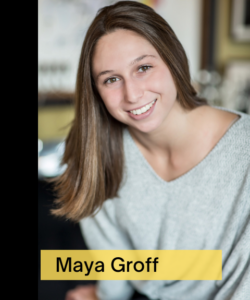 Literature, and Culture, emphasizes misconceptions regarding the sharp division between the sciences and humanities. When starting coursework at UNC, she was unfamiliar with the interdisciplinary middle ground connecting the two fields; however, after joining HHIVE and taking a couple health and humanities courses, she later found that the health humanities has made her STEM classes appear far more applicable to real-life. While the sciences equip her with an analytical toolset, the humanities give her the opportunity to think more critically about texts and conceptualize different human experiences. To her, the “health humanities made science feel more human.” Especially while working in a cardiovascular engineering lab, she expresses that the “health humanities guides her scientific mind and thinking” by “adding nuance to her understanding” of the research she is conducting.
Literature, and Culture, emphasizes misconceptions regarding the sharp division between the sciences and humanities. When starting coursework at UNC, she was unfamiliar with the interdisciplinary middle ground connecting the two fields; however, after joining HHIVE and taking a couple health and humanities courses, she later found that the health humanities has made her STEM classes appear far more applicable to real-life. While the sciences equip her with an analytical toolset, the humanities give her the opportunity to think more critically about texts and conceptualize different human experiences. To her, the “health humanities made science feel more human.” Especially while working in a cardiovascular engineering lab, she expresses that the “health humanities guides her scientific mind and thinking” by “adding nuance to her understanding” of the research she is conducting.
Similarly, Baylee Materia, an honors and accelerated research student studying Neuroscience and English with a minor in Chemistry, describes how the health humanities not only challenges the rigid dichotomy between STEM and the humanities, but also provides her with different 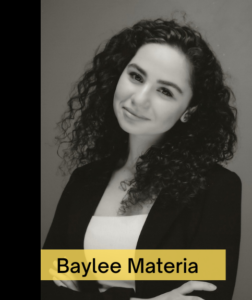 perspectives. Rather than the sciences and humanities existing as two separate entities, HHIVE seeks to combine two fields and view them as two halves of a whole–each equally different, but necessary to each other’s existence. In addition to this, she mentions that her participation in the health humanities field continues to present her with informative literature about the human experience. For instance, she credits an introductory health humanities course (ANTH 147) for having introduced her to one of her favorite texts, Look at Him. Written by Anna Starobinets, Look at Him is a novel and memoir that “chronicles the loss of the author’s unborn child to a fatal birth defect.” Baylee emphasizes that this novel not only “focuses on the main conflict at hand, but also delves deep into the complexity and psychological turmoil of a mother losing a child at birth.” Another notable recommendation made by Baylee includes Mom’s Cancer, an autobiographical graphic novel by Brian Fies, which highlights the author’s experience of his mother battling metastatic lung cancer.
perspectives. Rather than the sciences and humanities existing as two separate entities, HHIVE seeks to combine two fields and view them as two halves of a whole–each equally different, but necessary to each other’s existence. In addition to this, she mentions that her participation in the health humanities field continues to present her with informative literature about the human experience. For instance, she credits an introductory health humanities course (ANTH 147) for having introduced her to one of her favorite texts, Look at Him. Written by Anna Starobinets, Look at Him is a novel and memoir that “chronicles the loss of the author’s unborn child to a fatal birth defect.” Baylee emphasizes that this novel not only “focuses on the main conflict at hand, but also delves deep into the complexity and psychological turmoil of a mother losing a child at birth.” Another notable recommendation made by Baylee includes Mom’s Cancer, an autobiographical graphic novel by Brian Fies, which highlights the author’s experience of his mother battling metastatic lung cancer.
When asked about aspects that have surprised them while integrating the health humanities into their studies, Isabella Kritzer, an honors student 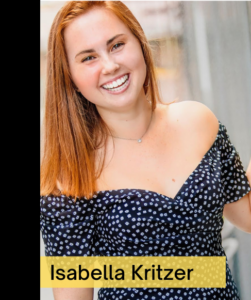 studying Biology and English, emphasizes her change in perspective when considering features of health and illness. As a future physician, Kritzer appreciates the health humanities for having taught her how to “not only look at health through the lens of a doctor, but to also see illness through the eyes of the patient.” To this, Maya Groff also chimes in, attesting to this level of empathetic perspective by extending the impact of health humanities to her own interpersonal relationships. Moreover, she points to literary critic Cindy Weinstein and neurologist Dr. Bruce Miller’s collaborative book, Finding the Right Words, which navigates Weinstein’s experience with her father’s early onset Alzheimer’s. Groff expresses that this book gave her insight into methods of approaching friends or family who might be going through a similar experience. She further emphasizes that the health humanities “makes a difference on both a small and large scale. It affects how you might see the world and how to engage with the world around you; it affects the way you exist.”
studying Biology and English, emphasizes her change in perspective when considering features of health and illness. As a future physician, Kritzer appreciates the health humanities for having taught her how to “not only look at health through the lens of a doctor, but to also see illness through the eyes of the patient.” To this, Maya Groff also chimes in, attesting to this level of empathetic perspective by extending the impact of health humanities to her own interpersonal relationships. Moreover, she points to literary critic Cindy Weinstein and neurologist Dr. Bruce Miller’s collaborative book, Finding the Right Words, which navigates Weinstein’s experience with her father’s early onset Alzheimer’s. Groff expresses that this book gave her insight into methods of approaching friends or family who might be going through a similar experience. She further emphasizes that the health humanities “makes a difference on both a small and large scale. It affects how you might see the world and how to engage with the world around you; it affects the way you exist.”
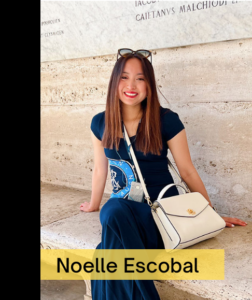 As a HHIVE member myself, I have found that the health humanities allow me to reconcile my interests in the physical and social sciences. While STEM continues to enhance my understanding of the world and how it works systematically, the humanities have provided me with the tools and opportunities to better preserve and understand the intangible aspects of human existence. Although I am hesitant to wholly accept the idea that the humanities make us “more human,” I do believe, to a certain extent, that when applied interpersonally, the health humanities provide me with opportunities to inform, empower, and engage with the world. For instance, the field has provided me with insights into the human condition through a variety of mediums that express and explore illness and health. Because of this, I find myself becoming a particularly well-rounded and informed individual. Overall, the health humanities have not only informed me of my responsibilities to others, but has also gifted me with a renewed perception of how I view myself and how I wish others to view me and my personhood.
As a HHIVE member myself, I have found that the health humanities allow me to reconcile my interests in the physical and social sciences. While STEM continues to enhance my understanding of the world and how it works systematically, the humanities have provided me with the tools and opportunities to better preserve and understand the intangible aspects of human existence. Although I am hesitant to wholly accept the idea that the humanities make us “more human,” I do believe, to a certain extent, that when applied interpersonally, the health humanities provide me with opportunities to inform, empower, and engage with the world. For instance, the field has provided me with insights into the human condition through a variety of mediums that express and explore illness and health. Because of this, I find myself becoming a particularly well-rounded and informed individual. Overall, the health humanities have not only informed me of my responsibilities to others, but has also gifted me with a renewed perception of how I view myself and how I wish others to view me and my personhood.
Noelle Escobal is a senior majoring in English and Comparative literature with a minor in Chemistry. Her interest in the health humanities stems from a curiosity in how her humanities major can intersect with STEM and other health related fields. She is also a passionate food blogger, and now serves as part of UNC’s first undergraduate culinary medicine club where she can engage in both her love of food and learn more about nutritional values in health and medicine. As a pre-med student, her goal is to approach the health institution with a food-minded perspective that empowers patients and other healthcare providers to engage in healthy lifestyles. She finds the exposure to health and humanities as well as nutritional education central to developing healthier, more modern medical practices as well as better patient-centered healthcare providers.


